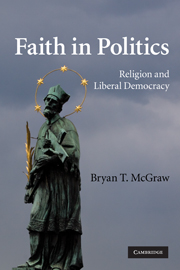Book contents
- Frontmatter
- Contents
- Acknowledgements
- Introduction
- 1 Europe's religious parties and the liberal consensus
- 2 The argument for deliberative restraint
- 3 The problem with secular reasons
- 4 Public reason and religious conflict
- 5 Religion and the problem of political autonomy
- 6 Making the most of conflict: religion and political toleration
- Conclusion: toward a better sort of liberal democracy
- Bibliography
- Index
3 - The problem with secular reasons
Published online by Cambridge University Press: 05 June 2012
- Frontmatter
- Contents
- Acknowledgements
- Introduction
- 1 Europe's religious parties and the liberal consensus
- 2 The argument for deliberative restraint
- 3 The problem with secular reasons
- 4 Public reason and religious conflict
- 5 Religion and the problem of political autonomy
- 6 Making the most of conflict: religion and political toleration
- Conclusion: toward a better sort of liberal democracy
- Bibliography
- Index
Summary
As I noted in chapter 2, even though most scholars who have examined the issue coalesce around a broad consensus that argues against the use of religious reasons in political life, there persists a good deal of disagreement over the particulars. A few suggest that religion ought never intrude into political deliberations, while others think it may play some role depending on the sort of political question at hand, the particular office someone may hold, or the venue in which the deliberation occurs. I do not mean, in this chapter and the next, to engage the whole range of arguments included in what I have called deliberative restraint; that would be a book unto itself. Instead, I mean to examine what I take to be the most persuasive arguments available within the consensus and show why they are mistaken on both moral and empirical grounds. The broad consensus in favor of deliberative restraint makes mistakes both moral and empirical in that it overestimates both the plausibility and attractiveness of a “restrained” political order and the threat of a religiously “engaged” one. Proponents of deliberative restraint weave together a seemingly compelling set of claims making restraint a linchpin of the democratic social and political order, but these do not stand up to closer examination, especially one that disentangles their moral and empirical threads. I focus first on deliberative restraint's moral claims, in particular those that argue for the priority of secular and then “public” reasons.
- Type
- Chapter
- Information
- Faith in PoliticsReligion and Liberal Democracy, pp. 88 - 125Publisher: Cambridge University PressPrint publication year: 2010



